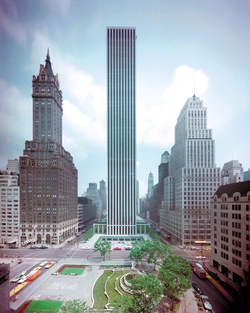They still have a bunch in Times Square and along Fifth Avenue.
I mean, are they? There's the big McDonald's there but even in pre-COVID times it wasn't the biggest (that actually went to the Oklahoma "bridge" McDonald's before they remodeled it at some point in the 2010s to add a Subway), not the one with the fanciest gimmicks (the one in Florida had the big Playplace and second "Bistro Gourmet" menu), and not even the
most unique in New York State. Other than that, I can't think of any truly flagship retail stores there anymore.
The mistake that urbanists make is assuming that they're there because of the city's high density when in reality they're tourist destinations run at a loss by the parent companies and only exist at their current locations for historical reasons.
I don't know if Macy's Herald Square makes a profit what with its enormous square footage and high cost of operations but the return on investment is probably terrible given that it's often
bandied about in store closing discussions and the fact that Macy's closed nearly all of the remaining "flagship" stores of the stores it took over in 2005-2006, including Miami (Burdines), Houston (Foley's), Portland (Meier & Frank), and probably others.
Hudson's (would be a Macy's today) closed its downtown Detroit store in the early 1980s, even in 1971 it was losing $9M a year to theft (in 1971 dollars!); with Wikipedia citing this article from TIME magazine article (
archived version). Coincidentally, this also illustrates a different picture than what urbanists like to paint about downtowns. Downtowns started to die because there was no longer a reason to go to them, and despite the article mentions "voracious space demands of the private auto" as a cause, the very next words are "the great northward movement of poor and undereducated blacks", something that urbanists aren't willing and will never address.
You're correct that there are no real unique stores anymore. Chains/franchising and the internet have made it so that there is no longer anything exclusive to big cities. The Apple Store on 5th Ave sells the exact same products as the one in an exurban mall; it just has fancier architecture and decor.
For a period of over fifty years New York City had the only American location of
Takashimaya and very briefly our once and future President
lured in French department store Galeries Lafayette to replace Bonwit Teller (one of the many "high fashion" New York department stores that don't exist anymore, alongside B. Altman, Barneys New York, and Lord & Taylor). Aside from Takashimaya, Nintendo World, and Galeries Lafayette I wouldn't be surprised if NYC had other "first and only" stores that never made it beyond a single (American) location.
Even if they're profitable, it's because they're a tourist destination. Actual city residents are fine buying their shit in a black concrete box or having it delivered; tourists want to "see the amazing store".
We talked in this thread about how restaurants in NYC are cramped, hard to get in (extremely expensive reservations, something unheard of even in top dollar restaurants elsewhere), and have a tendency to kick out paying customers. It's understandable why food delivery is so popular there, I can imagine something exists like that for retail.
That Apple Store pulls in something like $350m annually, so it's probably "worth it" by some calculation, but it's clearly a marketing budget. It has 500 employees and the land has to be worth a pretty penny.

The Fifth Avenue Apple store replaced a sunken courtyard area (meant for leasing space and I believe there was a restaurant back there in the 1970s), and after the courtyard was raised to ground level in the late 1990s (
guess who, again) it left a newly created basement area which remained vacant until Apple built there about eight years later.








